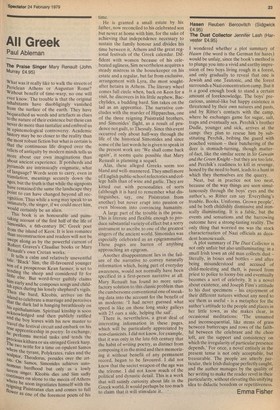Hasen Reuben Bercovitch (Sidgwick £4.95) The Dust Collector Jennifer Lash
(Harvester £4.95) I wondered whether a plot summary of Hasen (the word is the German for hares) would be unfair, since the book's method is to plunge you into a vivid and earthy impression of two boys living rough in a forest, and only gradually to reveal that one is Jewish and one Teutonic, and the forest surrounds a Nazi concentration camp. But it is a good enough book to stand a certain amount of foreknowledge. The boys' precarious, animal-like but happy existence is threatened by their own natures and pasts, and by Ritter's contacts with the camp, where he exchanges game for sugar, salt, traps and eventually sex. Perchik's brother Dudie, younger and sick, arrives at the camp: they plan to rescue him by substituting Perchik, bribing the guard with poached venison — their butchering of the deer is stomach-turning, though matterof-fact, like the similar scene in Sir Gawain and the Green Knight —but they are too late, and Perchik's readiness to kill in revenge, honed by the need to hunt, leads to a hunt in which they themselves are the quarry.
Neat, but in practice not too neat, because of the way things are seen simultaneously through the boys' eyes and the • author's, so Ritter can say 'Everything's trouble. Books. Uniforms. Grown people', and be both childishly dismissive and ironically illuminating. It is a fable, but the events and sensations and the harrowing outcome have a strong-tasting reality. The only thing that worried me was the stock characterisation of Nazi officials as decadent homosexuals.
A plot summary of The Dust Collector is not only unfair but also unilluminating: in a small Irish town an old man collects dust — literally, in boxes and bottles — and after being misunderstood and accused of child-molesting and theft, is passed from priest to police to loony-bin and eventually becomes a sort of celebrity. It is a novel about existence, and Joseph Finn's attitude to his dust specimens — his enjoyment of their different natures without any need to see them as useful — is a metaphor for the author's attitude to the people and places in her little town, as she makes clear, in occasional meditations: 'The unnamed and inconsequential, like stems of grass between buttercups and rows of the faithful between the celebrant and the choir loft, are the support and consistency on which the irregularity of particular presence depends.' For once, a novel entirely in the present tense is not only acceptable, but treasurable. The people are utterly particular, their Irish dialogue perfectly caught, and the author manages by the quality of her writing to make the reader revel in their particularity, without elevating this unifying idea to didactic boredom or repetitiveness.
Emma Fisher


































 Previous page
Previous page